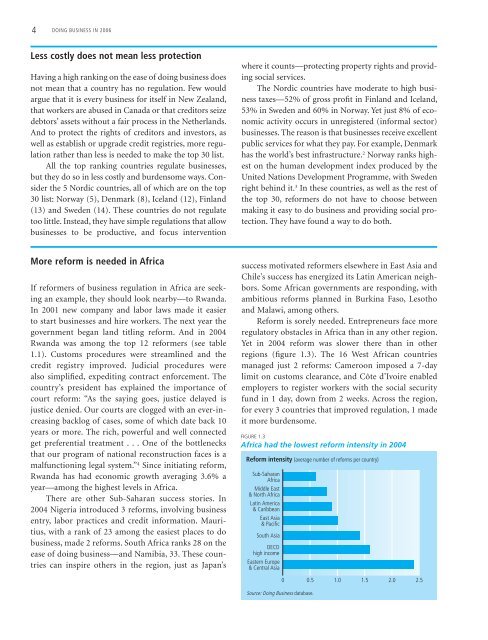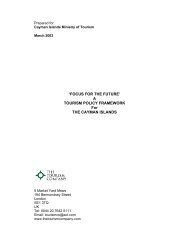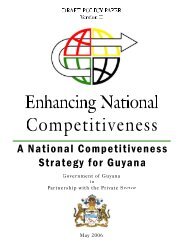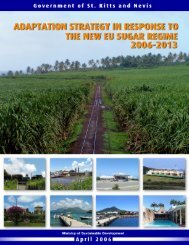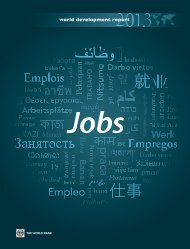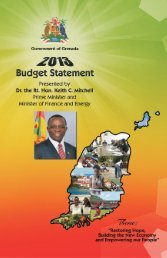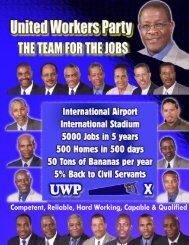Creating
Doing Business in 2006 -- Creating Jobs - Caribbean Elections
Doing Business in 2006 -- Creating Jobs - Caribbean Elections
You also want an ePaper? Increase the reach of your titles
YUMPU automatically turns print PDFs into web optimized ePapers that Google loves.
4 DOING BUSINESS IN 2006<br />
Less costly does not mean less protection<br />
Having a high ranking on the ease of doing business does<br />
not mean that a country has no regulation. Few would<br />
argue that it is every business for itself in New Zealand,<br />
that workers are abused in Canada or that creditors seize<br />
debtors’ assets without a fair process in the Netherlands.<br />
And to protect the rights of creditors and investors, as<br />
well as establish or upgrade credit registries, more regulation<br />
rather than less is needed to make the top 30 list.<br />
All the top ranking countries regulate businesses,<br />
but they do so in less costly and burdensome ways. Consider<br />
the 5 Nordic countries, all of which are on the top<br />
30 list: Norway (5), Denmark (8), Iceland (12), Finland<br />
(13) and Sweden (14). These countries do not regulate<br />
too little. Instead, they have simple regulations that allow<br />
businesses to be productive, and focus intervention<br />
where it counts—protecting property rights and providing<br />
social services.<br />
The Nordic countries have moderate to high business<br />
taxes—52% of gross profit in Finland and Iceland,<br />
53% in Sweden and 60% in Norway. Yet just 8% of economic<br />
activity occurs in unregistered (informal sector)<br />
businesses. The reason is that businesses receive excellent<br />
public services for what they pay. For example, Denmark<br />
has the world’s best infrastructure. 2 Norway ranks highest<br />
on the human development index produced by the<br />
United Nations Development Programme, with Sweden<br />
right behind it. 3 In these countries, as well as the rest of<br />
the top 30, reformers do not have to choose between<br />
making it easy to do business and providing social protection.<br />
They have found a way to do both.<br />
More reform is needed in Africa<br />
If reformers of business regulation in Africa are seeking<br />
an example, they should look nearby—to Rwanda.<br />
In 2001 new company and labor laws made it easier<br />
to start businesses and hire workers. The next year the<br />
government began land titling reform. And in 2004<br />
Rwanda was among the top 12 reformers (see table<br />
1.1). Customs procedures were streamlined and the<br />
credit registry improved. Judicial procedures were<br />
also simplified, expediting contract enforcement. The<br />
country’s president has explained the importance of<br />
court reform: “As the saying goes, justice delayed is<br />
justice denied. Our courts are clogged with an ever-increasing<br />
backlog of cases, some of which date back 10<br />
years or more. The rich, powerful and well connected<br />
get preferential treatment . . . One of the bottlenecks<br />
that our program of national reconstruction faces is a<br />
malfunctioning legal system.” 4 Since initiating reform,<br />
Rwanda has had economic growth averaging 3.6% a<br />
year—among the highest levels in Africa.<br />
There are other Sub-Saharan success stories. In<br />
2004 Nigeria introduced 3 reforms, involving business<br />
entry, labor practices and credit information. Mauritius,<br />
with a rank of 23 among the easiest places to do<br />
business, made 2 reforms. South Africa ranks 28 on the<br />
ease of doing business—and Namibia, 33. These countries<br />
can inspire others in the region, just as Japan’s<br />
success motivated reformers elsewhere in East Asia and<br />
Chile’s success has energized its Latin American neighbors.<br />
Some African governments are responding, with<br />
ambitious reforms planned in Burkina Faso, Lesotho<br />
and Malawi, among others.<br />
Reform is sorely needed. Entrepreneurs face more<br />
regulatory obstacles in Africa than in any other region.<br />
Yet in 2004 reform was slower there than in other<br />
regions (figure 1.3). The 16 West African countries<br />
managed just 2 reforms: Cameroon imposed a 7-day<br />
limit on customs clearance, and Côte d’Ivoire enabled<br />
employers to register workers with the social security<br />
fund in 1 day, down from 2 weeks. Across the region,<br />
for every 3 countries that improved regulation, 1 made<br />
it more burdensome.


